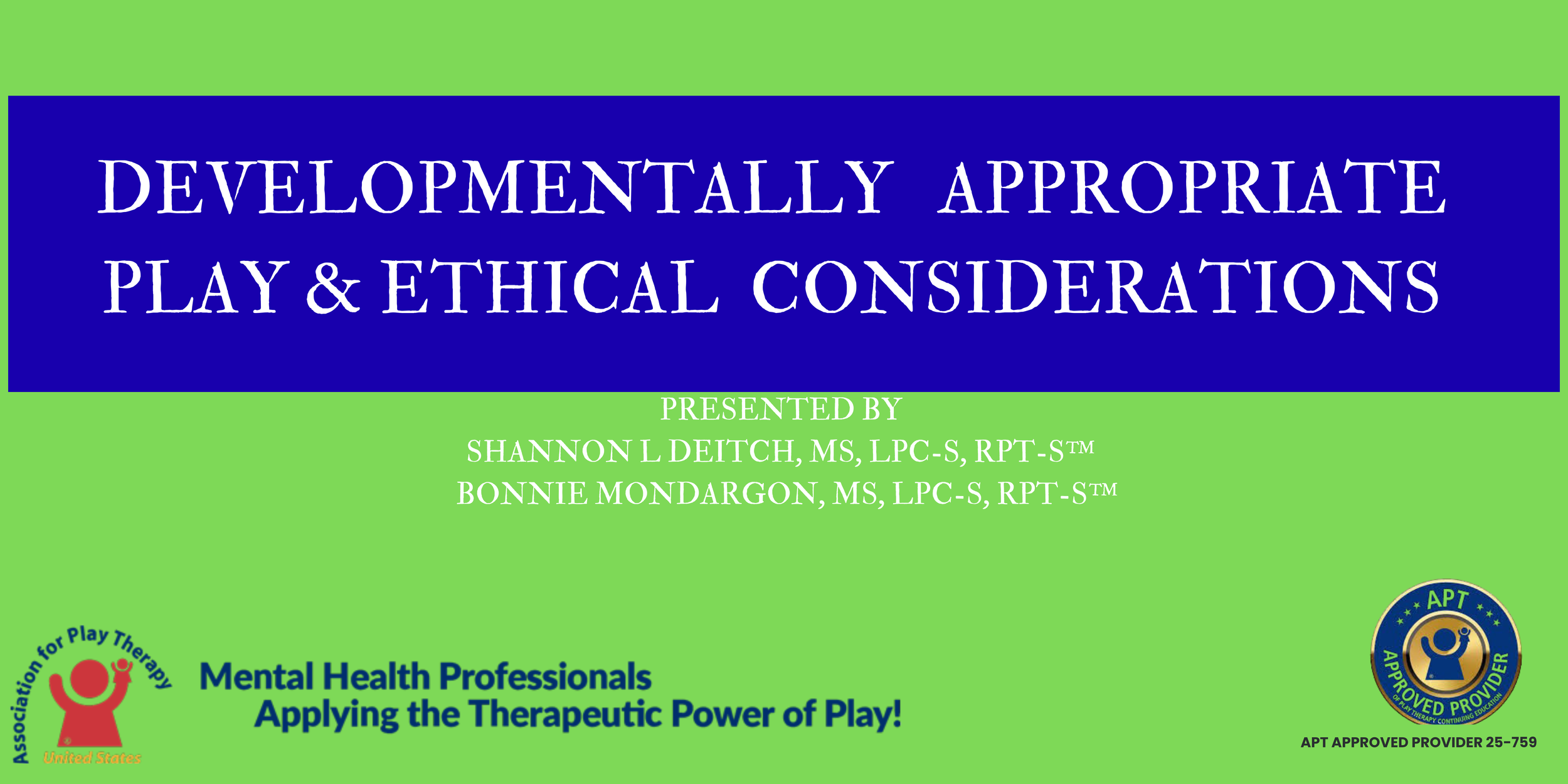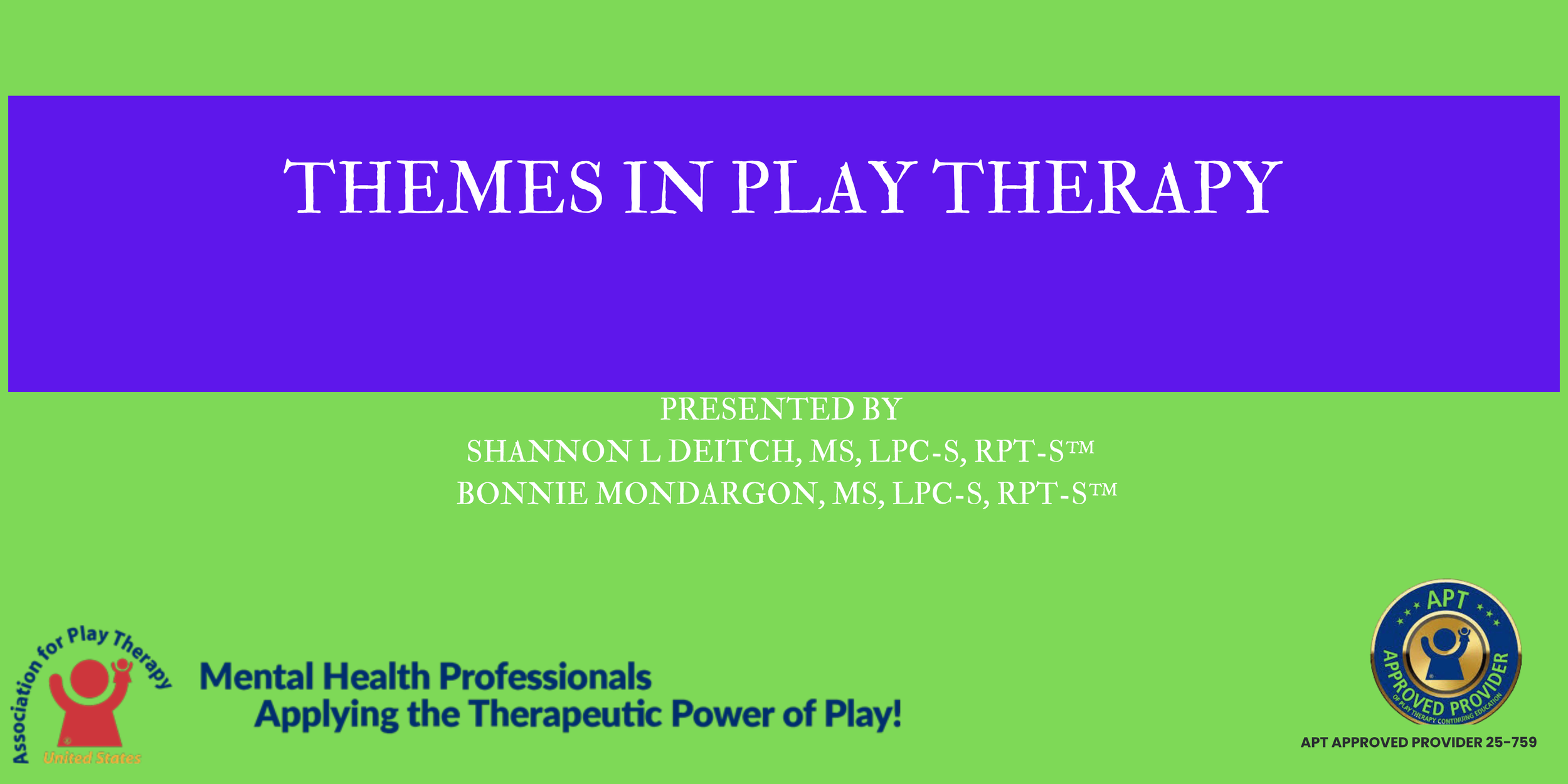Continuing Education Courses.
Play ‘N Learn Training, LLC provides APT Continuing Education (CEs) by approved APT provider #25-759 . The courses can be taken individually as stand alone courses. The course can also be taken sequentially. Courses start with the very foundations of play therapy and continue to build to intermediate and advanced skill levels.
Objectives
Review the historical aspects of play therapyDescribe the current theoretical approaches of play therapyList Requirements for becoming a Registered Play TherapistIdentify the therapeutic powers of playDescribe basic tracking skills in play therapyDemonstrate basic tracking skills in Play Therapy
Course 1. What is Play Therapy?
This is a beginning level continuing education course for licensed mental health professionals and graduate students in a mental health program. This course will review the requirements for becoming a registered play therapist™, give a historical overview of play therapy theories and development, and introduce the principles for working with children in play therapy. The therapeutic powers of play will be explored as a foundational layer for all theoretical orientations.
6 Contact CEs by approved APT Provider #25-759
Friday, January 23, 2026
Registration closes Saturday, January 17, 2026
Registration closes Saturday, February 21, 2026
Objectives
Identify and categorize the selection of toys for play therapyDiscuss an understanding of the history of Child Centered Play TherapyAnalyze components of a play therapy play roomDescribe and demonstrate the basic skill of tracking in play therapyDescribe and demonstrate the basic skill of reflecting feelings in play therapyDescribe and demonstrate the basic skill of reflecting content in play therapy
Course 3. THERAPEUTIC limit setting in play therapy
This is a beginning level continuing education course for licensed mental health professionals and graduate students in a mental health program. This course focuses on therapeutic limit setting across theories within a play therapy session. The main therapeutic limit setting model practiced will be the Child Centered ACT Model for setting limits.
6 Contact CEs by approved APT Provider #25-759
Friday, March 27, 2026
Registration closes Saturday, March 21, 2026
Objectives
Discuss the purpose of constructing important components for case filesReview steps needed to begin intake paperwork when initially seeing a clientDevelop a disclosure statement to share with parents at an initial intake sessionDiscuss the purpose of including parents in the therapeutic processIdentify how to include parents in the therapeutic processDemonstrate how to include parents in the therapeutic process
Registration closes Saturday, June 20, 2026
Course 5. Themes in play therapy
This is a beginning level continuing education course for licensed mental health professionals and graduate students in a mental health program. Children often have repetitive behaviors that may give insight to the Play Therapist as to difficulties the child is undergoing. This training will focus on understanding the importance of identifying themes from repetitive behaviors or patterns of play along with ideas for documenting themes in progress notes. Participants will also discuss communicating themes to parents to inform them of the child’s progress and level of readiness for termination.
6 Contact CEs by approved APT Provider #25-759
Friday, May 22, 2026
Registration closes Saturday, May 16, 2026
Objectives
Apply leading developmental theories to play therapy
Analyze discrepancies in development across cognitive, physical, and emotional characteristics of developmental stages from birth to age 12 as observed in the play roomDiscuss parental expectations when there are developmental discrepancies in the play room and how to address those expectations in parent meetingsIdentify and demonstrate ethical practices in play therapy across developmental stages in the play roomDiscuss play therapy interventions for parents, teachers, and caregiversExplain the impact of technology in play therapy across stages of development
Course 7. Play Therapy with Families
This is a beginning level continuing education course for licensed mental health professionals and graduate students in a mental health program. This course will discuss family systems theories and how to bring families into your play therapy room. Participants will take away several ideas to practice with families in their play therapy settings.
6 Contact CEs by approved APT Provider #25-759
Friday July 24, 2026
Registration closes Saturday, July 18, 2026
Course 2. Basic Skills in play Therapy: Tracking, Reflecting Feelings, and reflecting Content
This is a beginning level continuing education course for licensed mental health professionals and graduate students in a mental health program. This course will include a review of the historical development of Child Centered Play Therapy. Participants will identify and organize the toys used within the play therapy setting along with the play therapy room setup. The basic skills of tracking, reflecting feelings and reflecting content in play therapy will be discussed, applied and practiced.
6 Contact CEs by approved APT Provider #25-759
Friday, February 27, 2026
Course 4. Your Playtherapy playbook: The paperwork you need to support parents from intake to termination
This is a beginning level continuing education course for licensed mental health professionals and graduate students in a mental health program. This course focuses on developing a play therapy playbook. The therapeutic alliance is created from the initial intake and is strengthened throughout the play therapy process. This course helps the beginning play therapist verbalize the importance of play therapy and the specialized skills play therapists offer from intake to termination.
6 Contact CEs by approved APT Provider #25-759
Objectives
Identify the purpose and importance of themes in play therapy
Discuss common themes observed in play therapyPractice identifying themes in a play sessionExplain how to document themes in clinical progress notesUtilize themes in parent sessions to communicate progressUsing the progress of the theme to determine level of readiness for termination
This is a beginning level continuing education course for licensed mental health professionals and graduate students in a mental health program. This course will go through the developmental stages from birth to age 12 focusing on the cognitive, physical, emotional and social characteristics of each year. Tips for parents and caregivers will also be discussed. Navigating ethical considerations between children and caregivers will be threaded throughout this course.
6 Contact CEs by approved APT Provider #25-759
Friday, June 26, 2026
Objectives
Discuss knowledge of family and systemic theories in play therapy
Identify interventions for the various roles in the family system in play therapyPractice integrating family play therapy activities into a play roomDemonstrate essential skills in family play therapyDemonstrate an understanding of how cultural and social identity can influence the family play therapy sessionIdentify family patterns, themes and metaphors in play therapy
Objectives
Describe the purpose for therapeutic limit setting in play therapy using different theoretical approachesRecite the components for child centered therapeutic limit setting during a play sessionDiscuss challenges with setting therapeutic limits in the play therapy sessionDemonstrate therapeutic limit setting within a small group settingDiscuss how to apply the ultimate limit in play therapy sessionsPractice using ultimate limit setting within small groups
Friday, April 24, 2026
Registration closes Saturday, April 18, 2026






